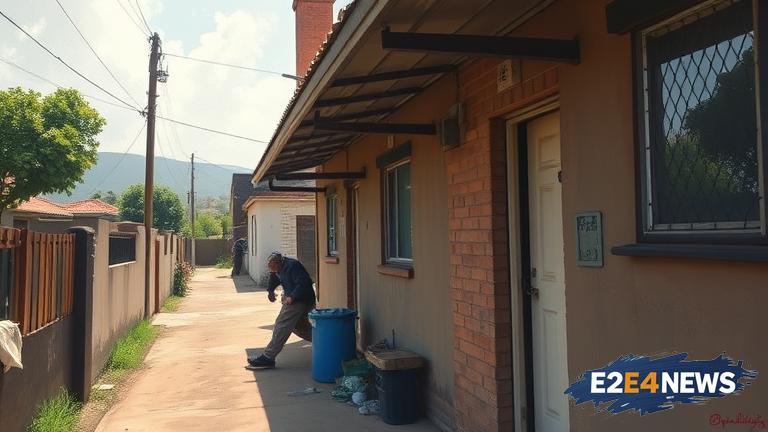Housebreaking has emerged as the leading crime in South Africa, with the country witnessing a significant surge in such incidents over the past year. According to recent statistics, housebreaking accounts for a substantial proportion of all reported crimes, leaving many to wonder about the underlying causes and potential solutions. The South African Police Service (SAPS) has reported a notable increase in housebreaking cases, with many of these incidents occurring in residential areas. The rise in housebreaking has been attributed to various factors, including poverty, unemployment, and a lack of effective community policing. In many instances, perpetrators have been found to be opportunistic, targeting vulnerable homes and exploiting weaknesses in security systems. The SAPS has urged citizens to remain vigilant and take necessary precautions to secure their properties, such as installing alarm systems and reinforcing doors and windows. Furthermore, community-led initiatives have been launched to promote neighborhood watch programs and encourage residents to report suspicious activity. Despite these efforts, housebreaking remains a pervasive issue, with many victims expressing frustration and disappointment with the lack of progress in addressing the problem. The economic impact of housebreaking should not be underestimated, as it can result in significant financial losses for affected households. In addition, the emotional toll of being a victim of housebreaking can be substantial, with many individuals experiencing anxiety, stress, and a sense of vulnerability. To combat the rising tide of housebreaking, the SAPS has pledged to increase patrols and improve response times to emergency calls. Moreover, the government has announced plans to enhance crime prevention strategies, including the deployment of advanced technology, such as CCTV cameras and drones, to monitor high-crime areas. However, some experts argue that a more holistic approach is needed, one that addresses the root causes of crime, such as poverty and inequality. They suggest that initiatives aimed at promoting economic empowerment, education, and job creation could help to reduce the incidence of housebreaking and other crimes. Meanwhile, citizens are being encouraged to take an active role in preventing housebreaking by reporting suspicious activity and cooperating with law enforcement agencies. The private security industry has also been called upon to play a greater role in supporting the SAPS and providing additional resources to combat housebreaking. As the situation continues to unfold, it is clear that a multi-faceted approach will be required to effectively address the issue of housebreaking in South Africa. This will involve a combination of community engagement, technological innovation, and targeted policing strategies. By working together, it is possible to reduce the incidence of housebreaking and create safer, more secure communities for all. The SAPS has reassured the public that they are committed to tackling the problem of housebreaking and are exploring new and innovative ways to prevent and investigate these crimes. In the meantime, citizens are advised to remain cautious and take all necessary precautions to protect themselves and their properties. The fight against housebreaking is an ongoing one, and it will require the collective efforts of law enforcement agencies, community organizations, and individual citizens to make a meaningful impact. As the country moves forward, it is essential that the issue of housebreaking remains a top priority, and that all stakeholders work together to find effective solutions to this pervasive problem.
